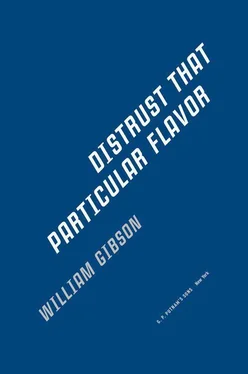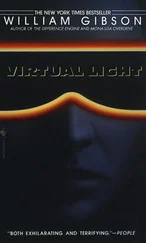The lure of that got me out there, doing something I secretly felt I probably shouldn’t quite be doing. The results are collected here, along with some “talks,” an even more problematic form for me, because writers, it seems to me, should write, not make speeches. But speeches, like quasi-journalistic writing assignments, can come attached to plane tickets, to hotel rooms in cities one might never have thought of visiting otherwise. In writing speeches, curiously, one sometimes finds out what one thinks, at that moment, about something. The world at large, say. Or futurity. Or the impossibility of absolutely grasping either. Generally they make me even more uncomfortable to write than articles, but later, back in the place of writing fiction, I often discover that I have been trying to tell myself something.
When I taught myself to write fiction, I eventually accepted that I had learned to do what passes for the writing of fiction when I’m the one doing it. The volume on the imposter-syndrome module decreased. Writing nonfiction, I’ve often felt as though I’m applying latex paint to the living room walls with a toothbrush. The volume on the module shoots up. Perhaps people will assume that the resulting texture is deliberate. Perhaps not. Writing fiction is a unique activity for me, a neurological territory, an altered state. Writing nonfiction isn’t, quite, but I’m gradually coming to accept that I’ve learned to do what passes for the writing of nonfiction when I’m the one doing it.
The following pieces are performed, then, on the African thumb piano, an instrument I scarcely know how to play.
They were composed, however, on one that has no name, and which I am yet to see.
— VANCOUVER, AUGUST 2011

THE BOY CROUCHES beside a fence in Virginia, listening to Chubby Checker on the Rocket Radio. The fence is iron, very old, unpainted, its uprights shaved down by rain and the steady turning of seasons. The Rocket Radio is red plastic, fastened to the fence with an alligator clip. Chubby Checker sings into the boy’s ear through a plastic plug. The wires that connect the plug and the clip to the Rocket Radio are the color his model kits call “flesh.” The Rocket Radio is something he can hide in his palm. His mother says the Rocket Radio is a crystal radio: She says she remembers boys building them before you could buy them, to catch the signals spilling out of the sky.
The Rocket Radio requires no battery at all. Uses a quarter mile of neighbor’s rusting fence for an antenna.
Chubby Checker says do the twist.
The boy with the Rocket Radio reads a lot of science fiction — very little of which will help to prepare him for the coming realities of the Net.
He doesn’t even know that Chubby Checker and the Rocket Radio are part of the Net.

ONCE PERFECTED , communication technologies rarely die out entirely; rather, they shrink to fit particular niches in the global info-structure. Crystal radios have been proposed as a means of conveying optimal seed-planting times to isolated agrarian tribes. The mimeograph, one of many recent dinosaurs of the urban office place, still shines with undiminished samizdat potential in the century’s backwaters, the late-Victorian answer to desktop publishing. Banks in uncounted third-world villages still crank the day’s totals on black Burroughs adding machines, spooling out yards of faint indigo figures on long, oddly festive curls of paper, while the Soviet Union, not yet sold on throwaway new-tech fun, has become the last reliable source of vacuum tubes. The eight-track — tape format survives in the truck stops of the Deep South, as a medium for country music and spoken-word pornography.
The Street finds its own uses for things — uses the manufacturers never imagined. The microcassette recorder, originally intended for on-the-jump executive dictation, becomes the revolutionary medium of magnitizdat , allowing the covert spread of suppressed political speeches in Poland and China. The beeper and the cellular telephone become tools in an increasingly competitive market in illicit drugs. Other technological artifacts unexpectedly become means of communication, either through opportunity or necessity. The aerosol can gives birth to the urban graffiti matrix. Soviet rockers press homemade flexi-discs out of used chest X rays.

THE KID with the Rocket Radio gets older. One day he discovers sixty feet of weirdly skinny magnetic tape snarled in roadside Ontario brush. This is toward the end of the Eight-Track Era. He deduces the existence of the new and exotic cassette format: this semi-alien substance, jettisoned in frustration from the smooth hull of some hurtling ’Vette, settling like new-tech angel hair.
I BELONG to a generation of Americans who dimly recall the world prior to television. Many of us, I suspect, feel vaguely ashamed about this, as though the world before television was not quite, well, the world. The world before television equates with the world before the Net — the mass culture and the mechanisms of Information. And we are of the Net; to recall another mode of being is to admit to having once been something other than human.
The Net, in our lifetime, has propagated itself with viral rapidity, and continues to do so.
In Japan, where so many of the Net’s components are developed and manufactured, this frantic evolution of form has been embraced with unequaled enthusiasm. Akihabara, Tokyo’s vast retail electronics market, vibrates with a constant hum of biz in a city where antiquated three-year-old Trinitrons regularly find their way into landfill. But even in Tokyo one finds a reassuring degree of Net-induced transitional anxiety, as I learned when I met Katsuhiro Otomo, creator of Akira, a vastly popular multivolume graphic novel. Neither of us spoke the other’s language: Our mutual publisher had supplied a translator, and our “conversation” was relentlessly documented. But Otomo and I were still able to share a moment of universal techno-angst.
HIS LIVING ROOM was dominated by a vast matte-black media node that would put most Hollywood producers to shame. He pointed to an eight-inch stack of remote-control devices.
“I don’t know how to use them,” he said, “but my children do.”
“I don’t know how to use mine, either.”
Otomo laughed.
Today, Otomo’s collection of remotes is probably part of some artfully bulldozed gomi plain, landfill for Neo-Tokyo. Gomi : Japanese for “garbage,” a lot of which consists of outmoded consumer electronics — such as those recently redundant remotes. Wisely assuming a constant source, the Japanese build themselves more island out of it.
The sexiness of newness, and how it wears thin. The metaphysics of consumer desire, in these final years of the twentieth century…
Two years ago I was finally shamed into acquiring a decent audio system. A friend had turned up in the new guise of high-end-audio importer, and my old “system,” so to speak, caused him actual pain. He offered to go wholesale on a total package, provided I let him select the bits and pieces.
I did.
It sounds fine.
But I’m not sure I really enjoy the music any more than I did before, on certifiably low-fi junk. The music, when it’s really there, is just there. You can hear it coming out of the dented speaker grille of a Datsun B210 with holes in the floor. Sometimes that’s the best way to hear it.
Читать дальше












